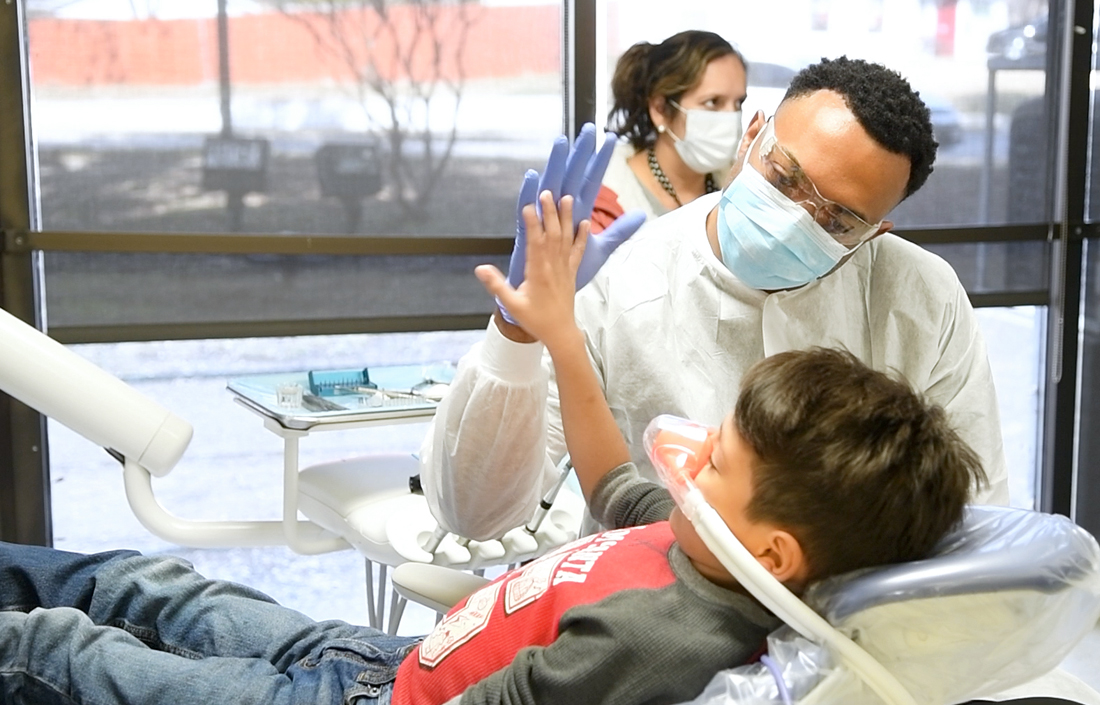Health equity hero

In just the Dallas area alone, according to Texas A&M School of Dentistry faculty member Dr. Dan Burch, there are 300,000 people with intellectual disabilities who struggle to access dental care. It can be difficult for them to find dentists who know how to care for patients with special needs. Among the 14 counties that make up the DFW area Burch, clinical associate professor in pediatric dentistry, is one of about five dentists who sees these patients long term. This is something he is working hard to change. His efforts have earned him the 2022 DentaQuest Health Equity Hero award, as well as multiple grants to fund his continue this work.
“Our 2022 heroes are making an impact across the nation, helping our country’s most vulnerable populations access quality health care,” DentaQuest’s announcement reads.
DentaQuest, an oral health care company, selected Burch in recognition of the work he has done to launch the Compromised Care and Hospital Dentistry Fellowship at Texas A&M’s dental school, establishing the nation’s first special care dentistry postdoctoral fellowship that focuses on training dentists from underrepresented minority groups.
In just two years, the program has led to an increase in access to care for more than 15,000 patients with special needs, and its success has served as a blueprint for other dental programs across the country, according to Burch.
The Health Equity Hero award is accompanied by a $5,000 monetary prize, which DentaQuest donates in the name of the award winner to a nonprofit of their choice. Burch requested for his prize money be donated to the Texas A&M Foundation.
“The success that we’ve had so far in the fellowship has caught the attention of all these academies,” Burch says. “What truly makes us unique outside of the sheer number of patients that we’re seeing across all these community clinics and hospitals is that we’re the first minority program in the nation to ever do this. It’s a blessing to be under A&M and to have such a great impact locally and start to have that impact nationally. It’s been a great journey.”
The DentaQuest award is only the latest in a string of recognitions Burch and his fellowship program have received. As of 2020, he says, he has received roughly $10 million in funding from various sources. They vary across several different programs, but they all come around to furthering special care dentistry.
One grant, he says, will allow pre-doctoral students to come out to the community clinics to observe and work on patients with special needs, getting some hands-on experience. Another grant will allow the pediatric department to hone its curriculum as it relates to special needs care. A third grant will expand the Compromised Care and Hospital Dentistry Fellowship from two fellows to four.
“Our fellowship has gained a lot of national notoriety,” Burch says. “We are helping to write the standard for what a post-graduate special care dentistry care program should look like. I’m hoping by the end of next summer our special care clinic here at the dental school opens, and students start to treat these patients on campus.”
Special care dentistry is an important issue for Burch because, he says, there just aren’t enough dentists trained for these kinds of patients across the country. Some of the programs that do exist, he adds, only train students on the bare minimum to meet mandated requirements. He wants to do better. This leaves a large population across the country untreated. As dental schools are often a “safety net” for their cities’ or states’ dental care needs, this can put the schools in a bind, he says.
“We have to have these programs in dental schools,” Burch says. “The more patients dental students see, regardless of the conditions they are treating, the more comfortable they are. My goal has been to infuse the special care dentistry curriculum in the school and make it as robust as possible with the hope that students will graduate fully prepared to see patients with special needs in their practices.”